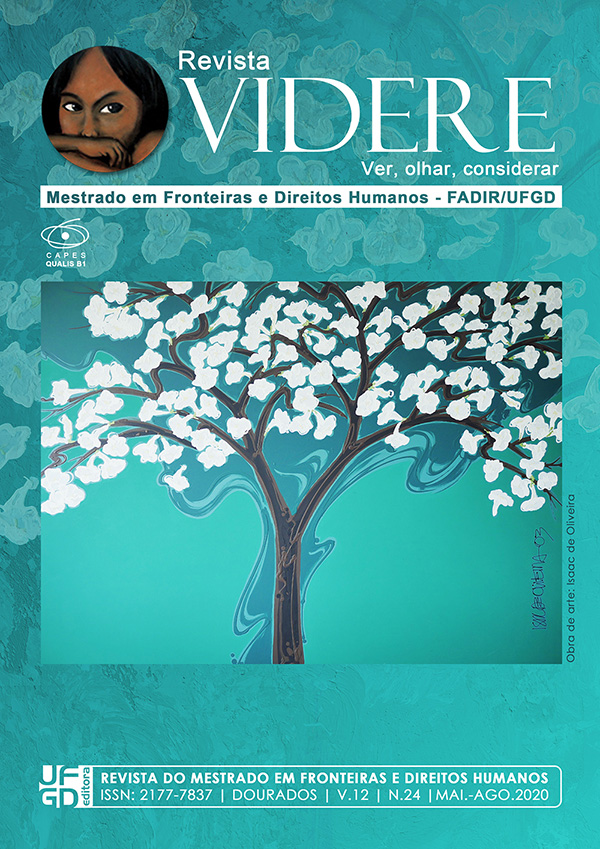What are human rights? A proposal of otherness, legal pluralism, interculturalism and decoloniality
DOI:
https://doi.org/10.30612/videre.v12i24.11225Keywords:
Rights of otherness. Otherness. Alternative law. Parallel law. Decolonial turn.Abstract
This article has as its object the analysis of the actual meaning of the word “human rights”, seeking to understand it from a legal-sociological approach. This subject has long been the object of reflection. However, definitions that address it satisfactorily, consistent with social reality, are lacking. From these findings the research problem arises: “what are human rights?”. The goal is not to answer the question, but to bring reflections and concerns about the approach to what human rights are. From the dialectical method, with an exploratory and descriptive purpose and a bibliographical and documentary means, the research initially exposes the traditional notions of human rights, markedly officialist, universalist and deontological, which are contrasted by the proposal of a critical theory, with an ontological focus, which proposes a definition of human rights based on alterity, legal pluralism, interculturalism and decoloniality.
Downloads
References
BOBBIO, Norberto. A Era dos Direitos. Rio de Janeiro: Elsevier, 2004.
CHAUÍ, Marilena; SANTOS, Boaventura de Sousa. Direitos humanos, democracia e desenvolvimento. São Paulo: Cortez, 2013.
COMPARATO, Fábio Konder. A Afirmação Histórica dos Direitos Humanos. 11 ed. São Paulo: Saraiva, 2017.
FLORES, Joaquin Herrera. A (re)invenção dos direitos humanos. Tradução de Carlos Roberto Diogo Garcia et at. Florianópolis: Boiteux, 2009.
FLORES, Joaquin Herrera. Direitos Humanos, Interculturalidade e Racionalidade de Resistência in Sequência, Santa Catarina, v. 23, n. 44, 9-29, 2002.
GALEANO, Eduardo. O Livro dos Abraços. Tradução de Eric Nepomuceno. 9 ed. Porto Alegre: L&MP, 2002.
HESPANHA, Antônio Manuel. Pluralismo jurídico e direito democrático. São Paulo: Annablume, 2013.
HUNT, Lyn. A Invenção dos Direitos Humanos: uma história. Tradução de Rosaura Eichenberg. São Paulo: Companhia das Letras, 2009.
LAPLANTINE, François. Aprender Antropologia. São Paulo: Brasiliense, 2003.
LARAIA, Roque de Barros. Cultura: um conceito antropológico. 19 ed. Rio de Janeiro: Zahar, 2006.
LYRA FILHO, Roberto. O que é Direito. São Paulo: Brasiliense, 2006.
MAZUOLLI, Valerio de Oliveira. Curso de Direitos Humanos. 5 ed. Rio de Janeiro: Forense, 2018.
PANIKKAR, Raimundo. Seria a noção de direitos humanos um conceito ocidental? in Direitos Humanos na Sociedade Cosmopolita. BALDI, César Augusto (org.). Rio de Janeiro: Renovar, 2004.
QUIJANO, Anibal. Colonialidade do poder e classificação social in SANTOS, Boaventura de Sousa; MENESES, Maria Paula (Org.). Epistemologias do Sul. São Paulo: Cortez, 2010.
PÉREZ LUÑO, Antonio Enrique. Derechos humanos, Estado de derecho y Constitución. 4. ed. Madrid: Tecnos, 1991.
RAMOS, André de Carvalho. Curso de Direitos Humanos. 5 ed. São Paulo: Saraiva, 2018.
SANTOS, Boaventura de Sousa. Por uma Concepção Multicultural de Direitos Humanos in Direitos Humanos na Sociedade Cosmopolita. BALDI, César Augusto (org.). Rio de Janeiro: Renovar, 2004.
SANTOS, Boaventura de Sousa. Para além do Pensamento Abissal: das linhas globais a uma ecologia de saberes. In: SANTOS, Boaventura de Sousa; MENESES, Maria Paula (Org.). Epistemologias do Sul. São Paulo: Cortez, 2010.
SOUSA JÚNIOR, José Geraldo. O Direito Achado na Rua: concepção e prática. Plataforma para um Direito emancipatório in SOUSA JÚNIOR, José Geraldo (org.). O Direito Achado na Rua: concepção e prática. Rio de Janeiro: Lumen Juris, 2015.
SOUSA JÚNIOR, José Geraldo. O Direito Achado na Rua: concepção e prática in SOUSA JÚNIOR, José Geraldo (org.). Introdução crítica ao direito. 4 ed. Brasília: Universidade de Brasília, 1993.
WARAT, Luis Alberto. A Rua Grita, Dionísio! Direitos humanos da alteridade, surrealismo e cartografia. Rio de Janeiro: Lumen Juris, 2010.
WARAT, Luis Alberto. Surfando na Pororoca: Ofício do mediador. DAL RI JÚNIOR, Arno et al (org.). Florianópolis: Fundação Boiteux, 2004.
WEIS, Carlos. Direitos Humanos Contemporâneos. 3 ed. São Paulo: Malheiros, 2014.
WOLKMER, Antonio Carlos. Pluralismo Jurídico: fundamentos de uma nova cultura no Direito. 3 ed. São Paulo: Alfa Omega, 2001.
WOLKMER, Antonio Carlos. Pluralismo jurídico, direitos humanos e interculturalidade. Revista Sequência, n. 53, dezembro de 2006, p. 113-128.
WOLKMER, Antonio Carlos. Teoria Círica dos Direitos Humanos. In: RADAELLI, Samual Manica; SIDEKUM, Antonio; WOLKMER, Antonio Carlos (orgs.) Enciclopedia Latino-Americana de Direitos Humanos. Blumenau: Edifurb/Nova Petrópolis, 2016.
Downloads
Published
How to Cite
Issue
Section
License
Authors must accept the publication rules when submitting the journal, as well as agree to the following terms:
(a) The Editorial Board reserves the right to make changes to the Portuguese language in the originals to maintain the cultured standard of the language, while respecting the style of the authors.
(b) Authors retain the copyright and grant the journal the right to first publication, with the work simultaneously licensed under the Attribution-NonCommercial-ShareAlike 3.0 Brazil (CC BY-NC-SA 3.0 BR) that allows: Share - copy and redistribute the material in any medium or format and Adapt - remix, transform, and create from the material. CC BY-NC-SA 3.0 BR considers the following terms:
- Attribution - You must give the appropriate credit, provide a link to the license and indicate whether changes have been made. You must do so under any reasonable circumstances, but in no way that would suggest that the licensor supports you or your use.
- NonCommercial - You may not use the material for commercial purposes.
- Sharing - If you remix, transform, or create from material, you must distribute your contributions under the same license as the original.
- No additional restrictions - You may not apply legal terms or technological measures that legally restrict others from doing anything that the license permits.
(c) After publication, authors are allowed and encouraged to publish and distribute their work online - in institutional repositories, personal page, social network or other scientific dissemination sites, as long as the publication is not for commercial purposes.



















